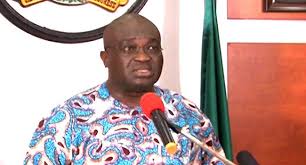FIC Report (Abia State) – The State Governor, Dr Okezie Ikpeazu says his administration will continue to subsidize Agro inputs and encourage Agricultural technology to support farmers in the State.
Governor Ikpeazu who stated this during the Flag-Off of the Training of the second batch of Extension Workers in 36 states and the Federal Capital Territory on Extension Tools, Methodologies and Selected Agricultural Value Chains organized by the Federal Ministry of Agriculture and Rural Development, Federal Department Agricultural Extension in collaboration with the National Agricultural and Research Liaison Services and Sasakawa-Africa Association noted that the goal of the extension workers is to get the new ecological improvement in Agro input seedlings in rural areas of the State.
The Governor represented by the Permanent Secretary, Ministry of Agriculture, Sir Charles Agbara said the government has partnered with some private sectors to revitalize Robber Estate in Amaeke and Ndi Oji Abam, Cashew Plantation in Umunneochi and Cocoa Plantations in the state to complement the efforts of the past Leaders especially Dr Michael Okpara in Agricultural Sector while calling on the Trainees to make use of the knowledge acquired to teach rural farmers to make use of the improved Cassava Stems, Seedlings as well as other techniques that can improve food production and nutrition in the state.
In his speech during the programme at the Headquarters of the Abia State Agricultural Development Projects, ADP in Umuahia, the Minister of Agriculture and Rural Development, Dr. Mohammad Mahmood Abubakar pointed out that Agricultural extension delivery remains the driver of all agricultural policies and research, without which all effort in the agricultural ecosystem may not realize its intended goals.
According to him, “Over the years, the fortunes of the agricultural extension system has declined majorly due to decreased funding, policy changes, reduced man-power and lack of interest of young people in agricultural entrepreneurship.
“This situation has affected food production exposing the country to the dangers of unemployment, youth restiveness and economic instability”.
The Honourable Minister said the Training was one of the several strategies planned by the FMARD to halt the drift in the agricultural extension system with aim of pursuing the revitalization agenda of the Nigerian economy by the Federal Government.
According to him, One of the key recommendations was to build the capacity of youth and existing Practitioners in agricultural extension delivery system, exposing and equipping them with best global practices and tools to enable them deliver with efficiency.
He assured the participants that the FMARD through its technical department, the Federal Department of Agricultural Extension has selected Resource Persons who will bring their expertise and experience to bear in the training and also well prepared technical reference materials, to ensure that they will receive the best.
“This training is first in series of batches that will empower you with knowledge that will enhance service deliver to farmers both in terms of production practices and equipment for technical support”, he stated.
The Federal Minister of Agriculture and Rural Development, Dr Muhammad Abubakar represented by a Deputy Director in the Ministry, Dr Mrs Ngozi Odunze said the Trainees will be empowered with 3 litres of Agro Chemical and Knapsack Sprayers, stressing that the Training is one of the strategies of the Federal Ministry of Agriculture and Rural Development to halt the drift in the Agricultural Extension system which she said has declined due to decrease in funding, policy changes, reduced Man-power and lack of interest of young people in Agricultural Entrepreneurship.
He said, at the inception of President Muhammadu Buhari’s administration, A Special Committee on the Revitalization of Agricultural Extension Service in Nigeria was constituted to, among others, recommend appropriate institutional structures, arrangements and capacity building for the delivery of effective and efficient pluralistic agricultural extension and advisory services in Nigeria using globally acceptable approaches and platforms.
Also in his address, the Permanent Secretary, Federal Ministry of Agriculture and Rural Development, FMARD Mr. Ernest Afolabi Umakhihe represented by the Abia State FMARD Director, Engr. Victor Ihediwa pointed out that the drive by the present Administration to revitalize agricultural extension services in Nigeria is to help farmers and value chain actors to make effective use of productive forces and advances in information technology to improve the livelihoods of rural populations, create jobs and promote sustainable agricultural and socio-economic development of the country.
He, however named the factors causing the decline in the National Agricultural extension system include the youth unwillingness to embrace Agricultural entrepreneurship, retirement, non-replacement and poor funding of the sub-sector and called on the Trainees to always be serious in the exercise.
According to him, the only way this can be achieved is to re-position the ADP system through training, provision of equipment and tools as well as funding to carry out their primary mandate and responsibilities to farmers.
He said that the intervention from the FMARD was geared towards enhancing the ability of existing Extension Agents in the field and infusing new skills in the youth who are interested in the sector.
The Director, Federal Department of Agricultural Extension, FMARD, Engr. Frank Satumari Kudla represented by Mr. Charles Ezendu highlighted the factors causing the decline in the national agricultural extension delivery system in to include; the decreasing number of Extension Agents caused by retirements, deaths and non-replacements; youth unwillingness to embrace agricultural entrepreneurship; poor capacity of existing extension agents to deliver due to lack or low quality of training, and the general poor funding of the sub-sector.
He said that the training was designed to empower participants with skills in the use of extension delivery methodologies and tools, as well as the best global practices in the agricultural value chains, as chosen by your state.
His words, “The training also provides you with necessary logistics and reference manuals in tune with emerging technologies, innovations and practices in the sub-sector. The resource persons have been carefully selected from Agricultural Research Institutions, Universities, Colleges of Agriculture, the ADP itself and few private sector practitioners. This selection is to ensure that you receive the best in the national agricultural extension system. The training will take the form of presentations, discussions, storming and practical sessions to expose participants to all aspect of extension methodologies, tools and good agricultural practices of the selected value chains, and also prepare them to provide services to farmers, community-based advisors and facilitators.
“Therefore, it is expected that beneficiaries will map farmers to themselves with the help of the ADP, conduct step-down training and prepare for future capacity building, input services and technology support to their farmers.This training of the Agricultural Extension Agents, among other interventions for the ADPs, will serve as a floodgate for many opportunities such as providing them with tools that will help them to give, not only agronomic, but also more practical services to farmers that will engender efficiency and more income”.
He urged the participants to pay rapt attention to all the lectures and demonstrations that will be done within the four day training, to be better equipped for the task ahead.
In a Welcome Address, the Program Manager, Abia ADP, Chief Israel Amanze thanked the Federal Ministry of Agriculture and Rural Development for their interventions as well as the State Government for its support to the ADP appealing for the employment and equipping of more extension workers and noted that the training will expose Trainees to the rudiments of extension services and practical aspect of Agricultural system.
In their remarks A prominent Royal Father in the State, Eze Philip Ajomiwe called on the Federal Government to increase the number of Participants from the State in the next phase of the Programme even as they passionately appealed that the challenges faced by the Extension Workers be addressed to optimal productivity.
In a vote of thanks, one of the Trainees, Mr Ndudim Ikelua thanked the Organizers for their efforts in revitalizing agriculture in Nigeria and promised to take the message to the farmers in the rural areas which will go a long way to impact positively on them.









